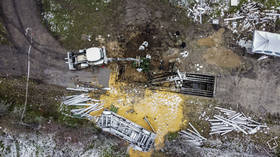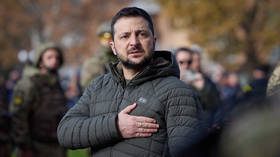NATO’s hair trigger: The Polish missile incident was a close brush with nuclear annihilation
The fervor with which Poland and others sought to drag NATO into a war with Russia should ring alarm bells for everyone

The world dodged a bullet this week, with some NATO members trying, but failing, to trigger Article 4 as a means of confronting Russia in Ukraine. We may not be so lucky next time.
The recent scandal surrounding what most of the world now agrees was an errant Ukrainian surface-to-air missile landing on Polish soil, killing two Polish citizens in the process, has exposed an ugly reality about the eastern reaches of NATO today: Despite the more reserved stance of the old NATO establishment (the US, UK, France, and Germany), the new upstarts in eastern Europe seem hell-bent on finding a mechanism that will justify NATO intervention in Ukraine.
This predilection for nuclear annihilation (no one should have any misgivings that a NATO-Russia conflict would end any other way) should send alarm bells ringing in the halls of power throughout NATO and the rest of the world, because left to their own devices, the Russophobic officials that dominate the governments of Poland and the three Baltic republics act like lemmings, running toward the Ukrainian cliff, oblivious to their fate as they chase the fantasy of NATO defeating Russia on a European battlefield.
The rush to judgment that accompanied the arrival of the Ukrainian surface-to-air missile on Polish soil serves as a stark reminder about how the supposedly defensive characteristics of the NATO Charter can be used to promote, rather than deter, conflict.
Let there be no doubt – NATO was aware that the missile that impacted near the village of Przewodów in Poland, killing two Polish citizens, was a Ukrainian surface-to-air missile the moment it was launched. The airspace over Ukraine is one of the most highly-monitored locations in the world. Without revealing sources and methods, suffice it to say there isn’t anything that happens over Ukraine that isn’t registered in real time on a NATO display in headquarters throughout Europe – including Poland.
And yet … Poland saw fit to summon the Russian ambassador and lodge a protest.
Moreover, Poland declared that it would increase its military readiness while contemplating the activation of Article 4 of the NATO Treaty, a mechanism which allows the alliance to discuss security threats to member states with an eye on possibly using NATO military force to rectify the situation. Article 4 is behind every combat deployment of NATO since its inception, from Serbia, to Libya, to Afghanistan.
On cue, Lithuanian President Gitanas Nausėda, whose country borders Poland, tweeted that “every inch of NATO territory must be defended!”
Czech Prime Minister Petr Fiala likewise turned to Twitter to exclaim: “If Poland confirms that the missiles also hit its territory, this will be a further escalation by Russia. We stand firmly behind our EU and NATO ally.”
For its part, Estonia called the news “most concerning,” with its foreign minister declaring via Twitter, “We are consulting closely with Poland and other allies. Estonia is ready to defend every inch of NATO territory.”
While all parties concurred that there was no basis for triggering Article 5 of NATO (i.e., the collective security clause), Article 4 was very much in play. Poland was adamant: The missile “attack” against Poland was clearly a crime, one that could not go unpunished. As such, under Article 4, Poland would be pushing “for NATO members and Poland to agree on the provision of additional anti-aircraft defense, including in part of the territory of Ukraine.”
And there you have it: “Including in part of the territory of Ukraine.”
Enter Germany, stage left: “As an immediate reaction to the incident in Poland, we will offer to strengthen air policing with combat air patrols over its airspace with German Eurofighters,” a German Defense Ministry spokesperson declared.
Cue NATO Secretary General Jens Stoltenberg, who convened an emergency meeting of NATO ambassadors in Brussels to discuss the Polish incident. According to the Finnish foreign minister (Finland, although not a NATO member, was invited to the meeting), “Closing the airspace [above Ukraine] will definitely be discussed. Various options of how we can protect Ukraine are on the table.”
While Germany reportedly rejected the establishment of a no-fly zone over Ukraine, noting that such an action would pose a threat of direct confrontation between Russia and NATO, one is left pondering how such a discussion came to be in the first place: Ukraine fired a surface-to-air missile, which was tracked by NATO as it impacted on Polish soil. And, as a result, NATO members end up discussing the possibility of invoking Article 4 of the NATO Charter, seeking to extend NATO air defense into Ukrainian air space in concert with the establishment of a no-fly zone enforced by NATO aircraft.
“Even if it was a blue on blue [incident] with a Ukrainian rocket that landed in Poland, I think there is still enough ground for Poland to invoke Article 4,” a former director of policy planning for NATO, Fabrice Pothier, declared.
Just to clarify what Mr. Pothier is saying: Because Ukraine fired a surface-to-air missile that ended up landing on Polish soil, NATO is justified in invoking Article 4, setting the stage for a possible NATO-Russia conflict in Ukraine which could lead to global nuclear annihilation.
If there was ever any doubt about the threat NATO posed to the entire world, there is no more.
That this is being promulgated on behalf of a Ukrainian leader who, despite universal consensus that the missile which hit Poland was Ukrainian, denies this possibility, all the while blaming Russia in the hopes that NATO will intervene, only adds to the insanity of this crisis.
While it appears that the world has dodged the potential death sentence triggered by the NATO Article 4 this time, the hair-trigger aspect of NATO’s Pavlovian response mechanism when it comes to seeking causal justification for military intervention in Ukraine should have everyone on high alert.
The statements, views and opinions expressed in this column are solely those of the author and do not necessarily represent those of RT.
https://www.rt.com/news/566710-polish-missile-incident-nato/





0 Comments:
Post a Comment
Subscribe to Post Comments [Atom]
<< Home